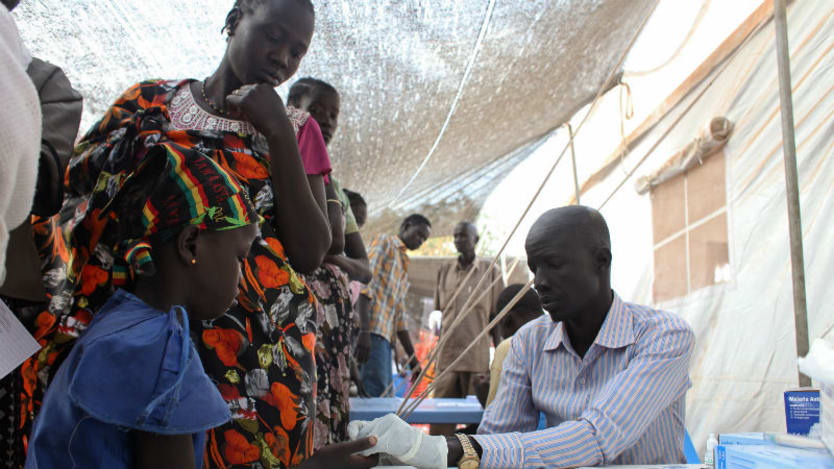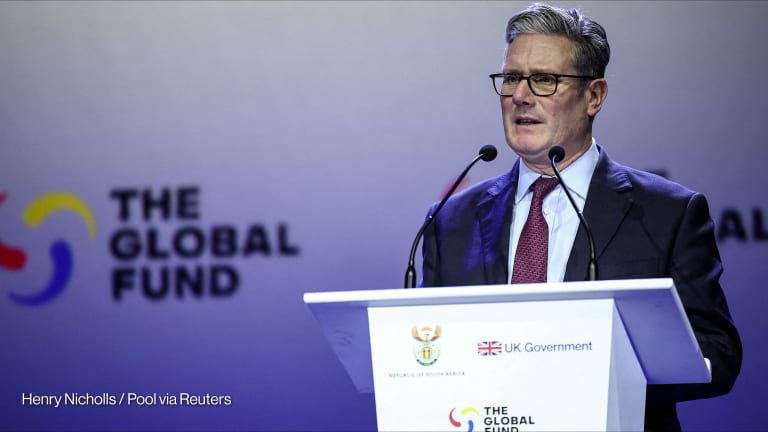
Disease eradication timelines, U.S. aid budget restrictions, and United Nations self-censorship on climate change. This week in development:
The incoming head of the European Commission unveiled her team on Tuesday, including the officials who will lead the commission's development and humanitarian work. Ursula von der Leyen, the former German defense minister who will head the European Commission for five years starting Nov. 1, announced that former Finnish finance minister Jutta Urpilainen will lead the European Union’s development policy, and Slovenia’s ambassador to the EU, Janez Lenarčič, will take the helm of the crisis management portfolio, which oversees humanitarian policy. The appointments — which will still require confirmation by the European Parliament — were generally well-received. One commission official expressed relief that another rumored candidate for the humanitarian post, a nominee from Hungary who has pushed for a focus on stopping irregular migration, did not move forward. Von der Leyen has tasked Urpilainen with helping to create “a new comprehensive strategy for Africa” and to build “a partnership of equals and mutual interest.” Søren Peter Andreasen, general manager of the body representing European Development Finance Institutions in Brussels, told Devex that, “a progressive Nordic commissioner is a very good starting point for leading this agenda.”
U.S. foreign aid agencies are still dealing with funding restrictions imposed by the White House Office of Management and Budget, even though they managed to push back against an effort by that office to “rescind” billions of dollars in aid funding last month. The U.S. Agency for International Development and State Department currently gains access to 25% of the funding contained in several accounts each week. The restriction is seen as an effort by OMB to prevent what White House budget hawks consider wasteful spending at the end of the fiscal year. Many in the aid community say the policies have only introduced greater confusion. In Central America, the Trump administration’s decision to cut funding has caused programs to scale back or shut down. Some U.S.-funded organizations have had to lay off dozens of — mostly local — staff, Teresa Welsh reports for Devex from Guatemala. The political outlook for aid inside the administration remains murky. Last week Politico reported on a draft memo outlining the results of a foreign assistance review, which called for focusing aid efforts on America’s “friends,” and pulling back multilateral assistance. That review was believed to be closely associated with John Bolton, the former national security adviser, who was fired by U.S. President Donald Trump on Tuesday.
The World Health Organization is at the center of another debate over whether or not the world can eradicate malaria by 2050. On Sunday, the Lancet Commission on malaria eradication, a panel of 26 experts, published a report calling the elimination of the disease “ambitious, achievable, and necessary.” Devex spoke to the head of the commission, Richard Feachem, who argued that “having an aggressive timeline, setting a date, being committed to it, actually encourages donors” to fund the cause. Two weeks earlier the World Health Organization Strategic Advisory Group on Malaria Eradication sent a different message. “We are very aware that setting dates when we have no evidence for them or setting unreasonable expectations can result in frustration and backlashes. And we don't want to do that,” said Pedro Alonso, director of WHO's global malaria program. Both reports arrived ahead of this week’s WHO-hosted forum, “Rising to the challenge of malaria eradication,” where participants were expected to debate the merits of setting eradication timelines.
The International Organization for Migration is censoring program documents out of concern they might be seen to conflict with Trump administration policies and priorities, according to leaked emails obtained by the Guardian. An IOM official based in the U.S. wrote to colleagues that documents related to programs funded by the State Department’s bureau of population, refugees, and migration, “must not be in conflict with current [U.S. government] political sensitivities.” The U.S. government provides roughly a quarter of IOM’s budget, $18 million of which comes from PRM, according to the Guardian. The U.N. agency’s relationship with the Trump administration was already rocky, after member states rejected America’s nominee to lead the IOM last year — for the first time since the 1960s. “The irony is that under its previous (and American) director-general, IOM invested hugely in an effort to become the leading international voice on the issue of 'climate migration’,” Jeff Crisp, a research associate at Oxford University’s Refugee Studies Centre, wrote on Twitter.
Update, Sept. 12, 2019: This article has been updated to clarify the identity of the source discussing the humanitarian post appointee.








